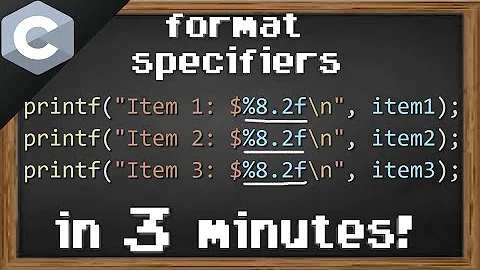printf conversion specifier for _Bool?
Solution 1
There is no specific conversion length modifier for _Bool type.
_Bool is an unsigned integer type large enough to store the values 0 and 1. You can print a _Bool this way:
_Bool b = 1;
printf("%d\n", b);
Because of the integer promotions rules, _Bool is guaranteed to promote to int.
Solution 2
Until C99, bool was not apart of standard C, and thus did not exist as a printf modifier. C99, defined _Bool (which you are using) to be an integer, thus you should be fine casting it as an integer to display (at least from a machine perspective). Alternatively, you could do something like:
printf("%d",foo?1:0);
Solution 3
As you stated in a comment to @Jack, "6.3.1.1p1 says that the conversion rank of _Bool is less than the rank of all other standard integer types".
In a call to printf, a char or short will be promoted and passed on the stack as an int (or an unsigned int), so I would think that using %d as a format specifier would be fine. That also means that you don't need the explicit cast to int, because that will happen automatically.
The only possible issue would be with how the compiler represents a _Bool, something that it probably implementation defined and could vary from one compiler to another. I see two likely implementations -- 0 and 1 or 0 and -1.
For the ultimate in portability, follow @user325181's answer and use a ternary to choose between two options. Either integers (which the compiler may optimize away) or strings.
Edit: As reported in other answers, a _Bool is defined as an unsigned integral type that can store either 0 or 1. Because of that, and the fact that it will be promoted to an unsignedint when passed to printf(), I would say that %u%d is the most appropriate specifier.
Solution 4
There is no. Just handling it like an int by using %d or %i specifier.
In C99, a new keyword, _Bool, is introduced as the new boolean type. In many aspects, it behaves much like an unsigned int, but conversions from other integer types or pointers always constrained to 0 and 1. Other than for other unsigned types, and as one would expect for a boolean type, such a conversion is 0 if and only if the expression in question evaluates to 0 and it is 1 in all other cases. The header stdbool.h provides macros bool, true and false that are defined as _Bool, 1 and 0, respectively.
The first way to implement it that come from into mind is by using a char or(int8_t) an enum and with bit fields. But actually, it depends. It can be a typedef for an int(as I've mentioned, it's used, but is not recommend, subject to bugs) or char or unsigned int or an enum and #define that's commonly used.
For exampe, Apple's implementation uses int,as you can see:
#ifndef _STDBOOL_H_
#define _STDBOOL_H_
#define __bool_true_false_are_defined 1
#ifndef __cplusplus
#define false 0
#define true 1
#define bool _Bool
#if __STDC_VERSION__ < 199901L && __GNUC__ < 3
typedef int _Bool;
#endif
#endif /* !__cplusplus */
#endif /* !_STDBOOL_H_ */
Others implementations:
Related videos on Youtube
Richard Hansen
Updated on September 15, 2022Comments
-
 Richard Hansen over 1 year
Richard Hansen over 1 yearWith
printf(), I can use%hhuforunsigned char,%hifor ashort int,%zufor asize_t,%txfor aptrdiff_t, etc.What conversion format specifier do I use for a
_Bool? Does one exist in the standard?Or do I have to cast it like this:
_Bool foo = 1; printf("foo: %i\n", (int)foo);-
Sergey Kalinichenko almost 12 years@RichardHansen If I recall it correctly, default promotions always apply to varargs: floats become doubles, chars become ints, and so on. This may have changed in C99, I am not sure.
-
 Richard Hansen almost 12 years@Jack: I'm skeptical -- citation needed. :) C99 6.3.1.1p1 says that the conversion rank of
Richard Hansen almost 12 years@Jack: I'm skeptical -- citation needed. :) C99 6.3.1.1p1 says that the conversion rank of_Boolis less than the rank of all other standard integer types, which can't be true if it'stypedefed (right?). Also, 6.3.1.2 describes special conversion rules for_Bool, which won't work if_Boolis simplytypedefed toint. -
Jim Balter almost 12 years@Jack No, it most certainly is not; please don't post false information. The default promotions apply when the type of the parameter isn't declared, so _Bool is implicitly converted to int.
-
Keith Thompson almost 12 years@Jack:
_Boolis definitely not a typedef forint._Boolis a keyword, and it's a distinct type. -
Sergey KalinichenkoI don't think you need a cast in front of
foo:_Boolwill be cast tointby default.
-
-
Jite almost 12 yearsor if you want to print a string as output you could do:
printf("foo: %s\n", foo ? "true" : "false"); -
 Richard Hansen almost 12 yearsSure, that alternative also works and is probably easier to type. However, I'm less interested in the various ways to print
Richard Hansen almost 12 yearsSure, that alternative also works and is probably easier to type. However, I'm less interested in the various ways to print_Boolthan confirmation that there is no length modifier or conversion specifier for_Bool. (A bonus would be a link to discussion as to why it doesn't exist: Oversight? Deemed unnecessary?) -
ecatmur almost 12 yearsIt's impossible to store into
_Boolany value other than0or1(6.3.1.2). So the conversion back tointwill (barring undefined behaviour) always yield0or1. -
Keith Thompson almost 12 years@ecatmur: Yes, and the macros
falseandtruein<stdbool.h>expand to0and1, respectively. -
ouah almost 12 yearsC says
_Boolis an unsigned integer type so-1is not possible. -
Jim Balter almost 12 yearsThe responses in the comments above are correct: there is no need to cast it, because it is automatically promoted ... and so there is no need for the ?: either. And the fact that there wasn't a printf modifier before C99 is irrelevant; they could have added one when they added _Bool ... but if they had, it would have printed "true" or "false".
-
Jim Balter almost 12 years@RichardHansen You can determine what printf formats there are and a lot more by obtaining and reading the standard yourself online, as there are free working drafts before and after the official standard ... just google C99 standard.
-
Jim Balter almost 12 years@RichardHansen You can also obtain the C99 Rationale online. However, there is no mention there of a printf format for _Bool (to be expected, as mostly it explains why things were done, rather than why they weren't).
-
tomlogic almost 12 years@ecatmur and ouah: thanks for that information, I've updated my answer.
-
Jim Balter almost 12 years%u works as well, especially for those retentive types like myself who prefer to always use unsigned specifiers with unsigned types. Also, I think
_Bool b = true;is better usage. -
tomlogic almost 12 yearsAnd none of those implementations are C99.
_Boolis a keyword in C99, and you won't find it defined in any headers. In the Apple example above, it's defining it for versions of C before C99. In your other examples, you have abooltype, and aBooleantype that is defined as anunsigned charor_Bool. -
 Richard Hansen almost 12 yearsC99 6.3.1.1p2 says "If an
Richard Hansen almost 12 yearsC99 6.3.1.1p2 says "If anintcan represent all values of the original type, the value is converted to anint; otherwise, it is converted to anunsigned int." Since anintcan represent all values of a_Bool, it will be promoted to anint, not anunsigned int(even though_Boolis an unsigned integer type). -
 Richard Hansen almost 12 yearsThis is currently the most correct answer --
Richard Hansen almost 12 yearsThis is currently the most correct answer --_Boolwill be promoted to anint, not anunsigned int. For posterity, it'd be nice if the answer contained references to the C99 standard specifying this behavior. -
 Richard Hansen almost 12 years6.5.2.2p7 for default argument promotions for arguments corresponding to the ellipsis, 6.5.2.2p6 for the definition of default argument promotion, 6.3.1.1 for integer promotions
Richard Hansen almost 12 years6.5.2.2p7 for default argument promotions for arguments corresponding to the ellipsis, 6.5.2.2p6 for the definition of default argument promotion, 6.3.1.1 for integer promotions










